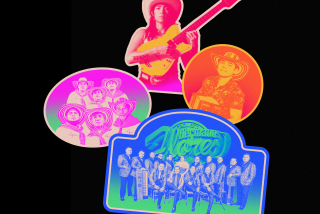Play That Folkie Music
In this age of computer music, of punk and rap and acid jazz, they came by the thousands Sunday to a hootenanny. They came to hear hobo songs and square dance, to catch cowboy poets and duelin’ banjos. And when they came across a man playing a saw, they stopped and watched and clapped.
Many came with their own instruments. Not trendy electric guitars, but fiddles and bagpipes and violins, harmonicas and mandolins, stand-up basses and accordions, guitarrons from Mexico and bodran drums from Ireland, six-string and 12-string acoustic guitars. And one saw.
And so they arrived at the 36th annual Topanga Banjo Fiddle Contest Dance and Folk Arts Festival at Paramount Ranch near Agoura Hills--all 4,000 or so of them.
This crowd was unplugged before unplugged was cool; they were people who might’ve booed Bob Dylan off the stage when he went electric.
It was a day when it was OK, cool even, to be something of a hillbilly, when it was OK to don cowboy boots and sandals and come down out of the urban hollers of the San Fernando Valley and the Westside in cars and pickups, on motorcycles and in campers.
After running through “Down by the Riverside,” one impromptu band launched into that classic of teen rebellion--”Mama Don’t Allow.” With a smidgen more angst, it could have been a pretty cool cover song by Pearl Jam.
“Mama don’t allow no fiddle playin’ ‘round here,” the song goes. “Mama don’t allow no fiddle playin’ ‘round here. But I don’t care what Mama don’t allow, ‘cause I’m gonna play my fiddle anyhow.”
Fiddle players, who strolled up to listen, broke in on cue, and the crowd joined in, substituting the words “fiddle playin’ ” for “rock ‘n’ roll” and whatever else anybody shouted out.
As they sang, some were toe tappin’, others foot stompin’ and head noddin’. Most everyone was clappin’ and smilin’ as they cruised by spontaneous jam sessions away from the main stage.
“You don’t have to be a picker, you don’t have to be a singer, you just walk around and join in,” explained Phil Chapnick of Malibu--a place that seems as likely a spot to find good fiddlin’ as New York City is to find good salsa.
*
Still, Chapnick walked from group to group like a modern-day troubadour, waiting for the nod that served as the invitation, listening for the beat and jumping right in.
“Look around, everybody’s happy here,” he said. “You don’t see that very often.”
The old-timers, sometimes patiently, sometimes not, taught the beginners. “No, that’s an F,” said a fiddler to a guitarist. “No, not a C. Put your fingers here. And here. There you go. You got it.”
And then they played.
There were records for sale. “The Great Hits of Hank Williams,” of course. Bobby Bland and the Sons of the Pioneers. Peter, Paul and Mary. Even Elvis and the Beatles.
“Hell, Elvis was a hick, too,” someone piped up. “The Beatles too,” someone else chimed in.
There was the Rivera family, who played just about whatever music you might want to hear--especially if it was mariachi. Ramon, 19, on trumpet; Tony, 17, on guitar; Dominick, 14, on violin; and Danielle, 11, on, well, she’s learning several instruments, thank you. They can play church music, jazz, rock, classical, ska and, of course, bluegrass.
“People are trying to understand themselves through their music,” said their father, who hurried off before giving his name. “For my kids, it’s for their culture. They don’t understand Spanish, but now they can sing it.”
The Rivera children demonstrated, decked out in black pants, blue velvet vests, white shirts and black Mexican bolo ties. They played a polka, the “Mexican Hat Dance” and something classical.
Not far away, 73-year-old Ed Mann was playing “You Are My Sunshine” on bagpipes, accompanied by a guy on guitar and another on drums. Mann has been playing the pipes for 40 years.
“I started late,” he said, then added, “I also play the banjo, the harmonica . . . and do woodcarving and blacksmithing.”
Finally, there was Charlie Blacklock, 70-something, who played the saw.
“I heard it on the radio and just decided that that was my instrument,” he said. To play the saw, Blacklock clamped the handle end between his legs, bent the blade over with one hand and used his other hand to draw a bow up and down against the saw’s teeth--all the while accompanying himself on harmonica.
It sounded surprisingly like an ordinary stringed instrument. “At first it’s hard to play,” he said. “You have to put the bend in the right place.”
*
Blacklock’s, of course, was no ordinary saw, but a 28-inch tenor, custom-made for him. There are bigger saws, too. Baritone and mini-bass saws can be about 3 feet long. What makes them special is the material. “It’s spring steel from England or Sweden,” he said. “They don’t have saw steel in the U.S.”
He called to a man in the crowd who had a banjo in his hands and a guitar strapped to his back. “How about ‘Golden Slippers’?” Blacklock suggested. “Fine,” the man replied. And they played.
“I just love that sweet sound,” Blacklock said afterward, idly plucking his saw. “I just love that sweet sound.”
More to Read
Sign up for The Wild
We’ll help you find the best places to hike, bike and run, as well as the perfect silent spots for meditation and yoga.
You may occasionally receive promotional content from the Los Angeles Times.






